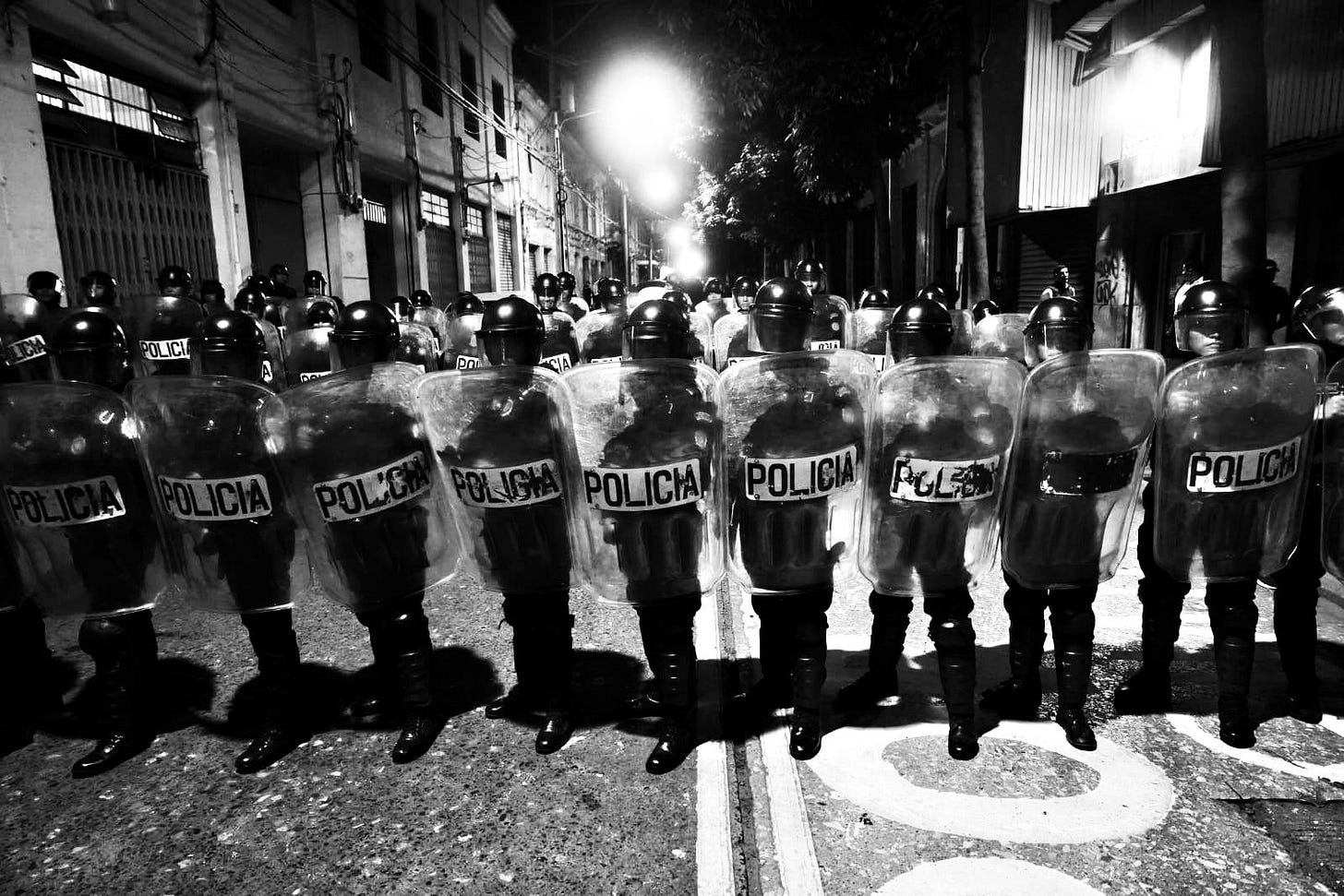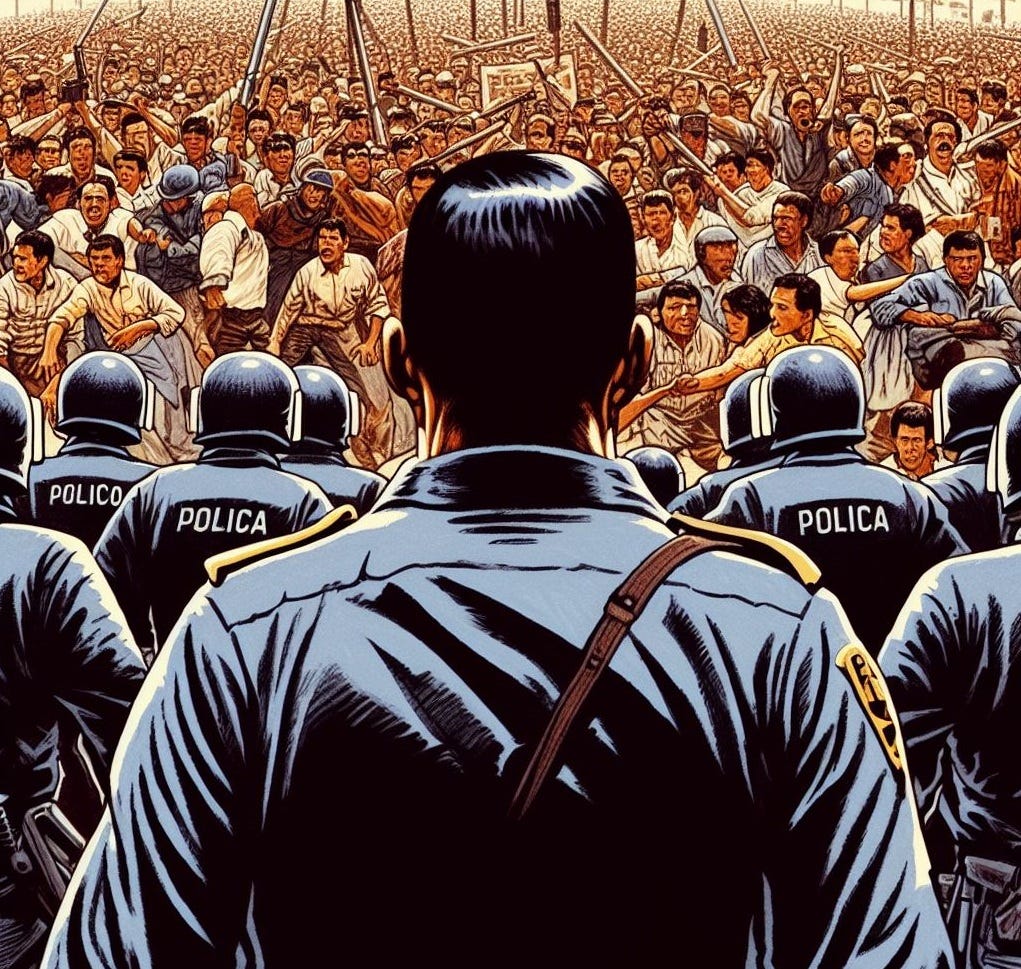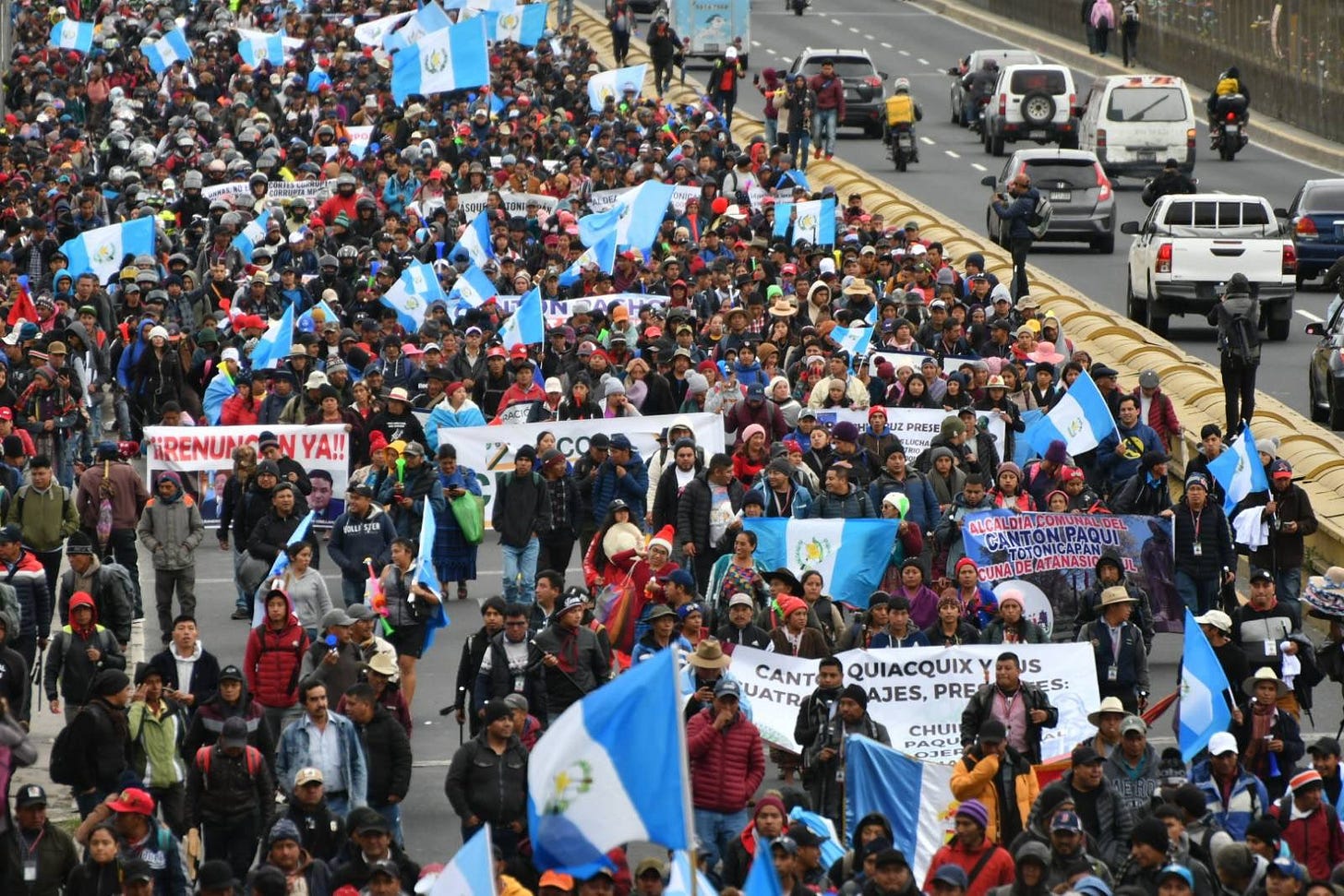Guatemala may be headed for a showdown
As protesters hold the streets, prosecutors continue trying to block president-elect Arévalo
Democratic process in Guatemala suffered a heavy blow this week — and the most severe yet for President-elect Bernardo Arévalo, whom the Guatemalan political elite have tried to derail via a host of corrupt measures since he overwhelmingly won the presidential election in August.
Speaking at a press conference on November 16, the Guatemalan Prosecutor's Office called for Arévalo, his Vice-President-elect Karin Herrera, and three senior members of his political party Movimiento Semilla, to be stripped of their immunity as part of a criminal investigation into student protests at University of San Carlo from 2022 to 2023.
Prosecutors say that Arévalo and his party used the protests, and the subsequent occupation of the University by students to boost their political campaigns. If the move by prosecutors is upheld, it could pave the way for Arévalo’s arrest before he takes office in January.
The move by the Attorney General’s office is merely the latest in a string of actions against Arévalo both during the campaign and after, which included raids into the campaign offices of Semilla candidates, and legal threats to disband the party— even Congressional candidates who recently won office.
In April 2022, students took over San Carlos University, Guatemala’s only public university, following what they considered the fraudulent election of the school’s new rector Walter Mazariegos. They said that during the vote by students, faculty, and administrators, Mazariegos only allowed those who would vote for him to cast their ballots.
The U.S. State Department sanctioned Mazariegos for oppressing democratic processes and taking the position of rector after what it called a fraudulent process.
The subsequent student occupations of the University resulted in extensive damages to the property. Shortly after they ended in June, prosecutors charged journalists who covered the student movement with a host of charges widely seen as fraudulent, from money-laundering to “sedition.”
Corrupt elements within the Guatemalan government seem to now be expanding the persecutions to include Arévalo and his party. The Inter-American Commission on Human Rights (IACHR), The Organization of American States (OAS), and representatives of the U.S. government all strongly rejected the latest move by prosecutors.
In a public statement, the IACHR stated that the organization “rejects the abusive exercise of power”, describing the persecution of Arévalo as “an attack against the democratic order, the ongoing presidential transition process and the individual and collective exercise of civil and political liberties in the country.”
Arévalo, who ran on an anti-corruption campaign, drew the ire of Guatemala’s deeply entrenched conservative political establishment after a surprisingly strong showing in the first round of presidential elections in June. Prosecutors linked to corruption — many under sanctions from the U.S.— have since repeatedly tried to undercut Semilla with accusations of criminal behavior unsupported by evidence.
They have attempted to suspend the party entirely on flimsy charges as well as persecuting other Semilla candidates. Until now, however, they had not implicated the president-elect directly in a criminal case.
The latest move also comes amid large ongoing protests against sitting president Alejandro Giammattei, in large part due to actions his administration has taken against Arévalo. Giammattei has deployed riot police in recent weeks against protesters, who have at times blocked roads in the country.
Protesters claim that Giammattei is attempting a “coup” against the president-elect— a term that many experts considered hyperbole at the time— but which in light of recent government actions now seems entirely possible.
Arévalo in public comments on Thursday called the actions of the Attorney General’s Office “an assault on Democracy,” before describing the actions of the Guatemalan elite as “A coup d'etats orchestrated by prosecutor Maria Consuelo Porras.”
Porras has been under sanctions by the U.S. for years amid accusations that she has used the power of her office to protect corrupt politicians. She has also been accused of blocking investigations of Guatemalan judges and investigators at the behest of sitting president Giammattei.
Porras denies the accusations, saying that she has been the victim of a biased media smear campaign. Protesters, who have been in the streets for nearly 50 days, demand her resignation.
Indigenous leaders of the social movement have promised to stay in the streets until Arévalo takes office.
Mathew Miller, spokesperson for U.S. State Department on November 16 announced visa restrictions on nearly a dozen Guatemalan officials.
In a public written statement, he wrote “The United States unequivocally rejects continued, brazen efforts to undermine Guatemala’s peaceful transition of power to President-elect Bernardo Arévalo. We also condemn the politically motivated raids and arrests targeting members of the Semilla party.”
Protesters seem to be in it for the long haul, however, and if efforts to block Arévalo continue, the sitting government may not be facing just pressure on the international front, but in the streets as well.

The Big Headlines in LATAM
Right-wing candidate Javier Milei is stoking conspiracy theories of fraud in upcoming presidential elections in Argentina, claiming that the ruling coalition may not allow him to win office. The candidate claimed earlier this month, without evidence, that fraud is the only reason he failed to win the presidency outright in the first round. As we reported last month, Milei lost the popular vote to current Economy Minister Sergio Massa.
Polls for the second round now show the candidates in a dead heat. Experts suggest the claims by Millei are designed to inspire turnout and polling monitoring among his base. Argentinians go to the polls today to decide who will take over a country where inflation is at 142%.
We will of course be updating on results.
Ship’s Business
The goodship Capybara sails on! Our Spanish language newsletter is going well and we’re preparing for the Holidays. We’re still trying to find a new home outside of Twitter. Help us leave that hellsite by following us on Instagram!
The pirates are excited about the Holidays, however, and a short break from PWS. But we’re planning a few special treats before we go for our beloved crew. Thanks again for reading and for supporting us. It’s difficult to believe we’re coming up on 2 years and 2000 subscribers.
Thank you for being a part of our voyage!
Spanish Word of the Week
salir de Guatemala y entrar en Guatepeor : “to leave Guatemala y enter Guata-worse
This phrase makes us giggle every time we hear it. It’s a clever play on words that could be translated to English as meaning roughly the same thing as “out of the frying pan and into the fire, but with the added bonus of being the ultimate dad joke.
The mala Guate-mala, is used here in it’s sense of “bad”, with “peor” (worse) added on the end to bring home the point. The literal translation would be “to leave Guate-bad, only to arrive at Guate-worse.”
And that pretty much sums up the situation for the sitting government in Guatemala currently. After losing elections, they are out of the frying pan and into the fire, and if things continue as they are currently, they may be headed for a full-blown rebellion in the streets.
Hasta pronto piratas!





Please consider giving this hardworking missionary & banned broadcaster full access to your posts. I'll make it worth your while😉. The podcast is up on my channel if you want to hear your work. Or tune to 9.955 mHz on a shortwave set tomorrow to catch the replay in S. America. 6PM New York Time.
Good work, Joshua. I quoted you today on my radio show.